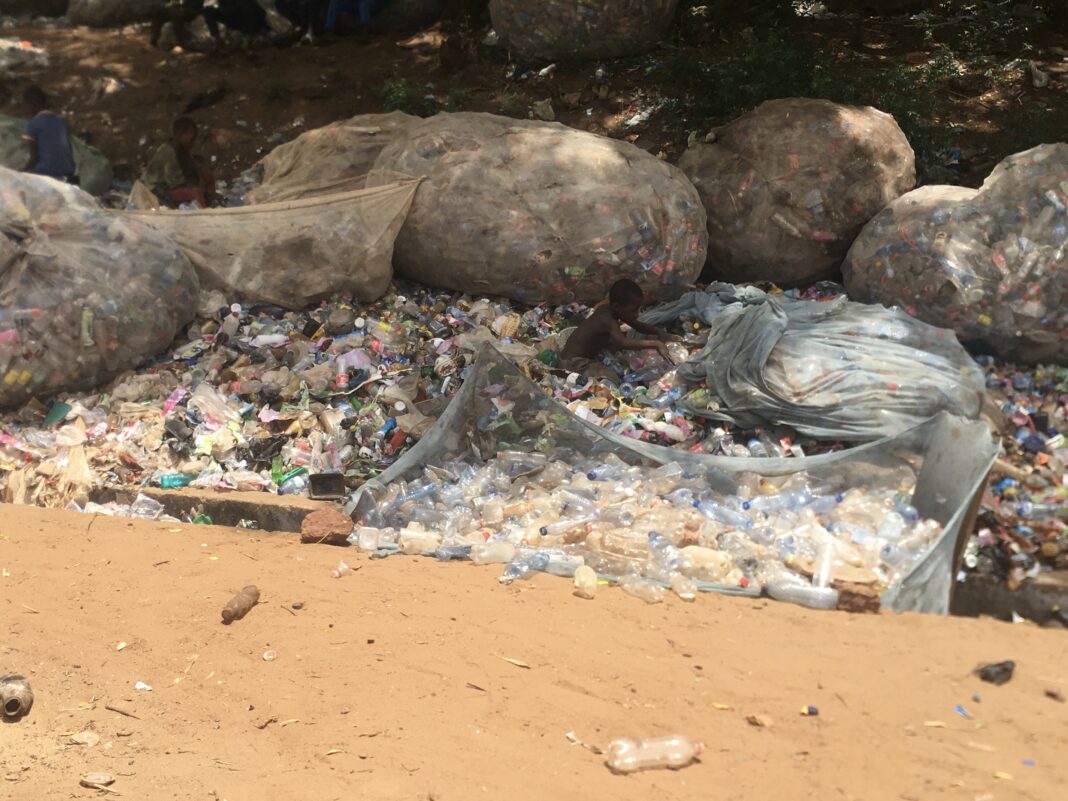10-year-old Gaddafi Abubakar moved through the streets of Sokoto central market with a 50-liter bucket full of sachet water, unperturbed by the noise of vehicular movement. The time was 12 p.m., and other children were in classrooms in schools around the metropolis. But Abubakar was on the street trying to eke out a living.
He told this reporter that staying out of school every Tuesday and some other days of the week has become a weekly routine for him to survive.
“My mother always buys the sachet water. I will sell it, and return the capital and the profit to her. Then she will add the money to buy what we will eat,” the Primary 4 pupil of Gwaza Primary School, said. He explained that he makes roughly N1,500 from the sale of the full bucket thrice daily.
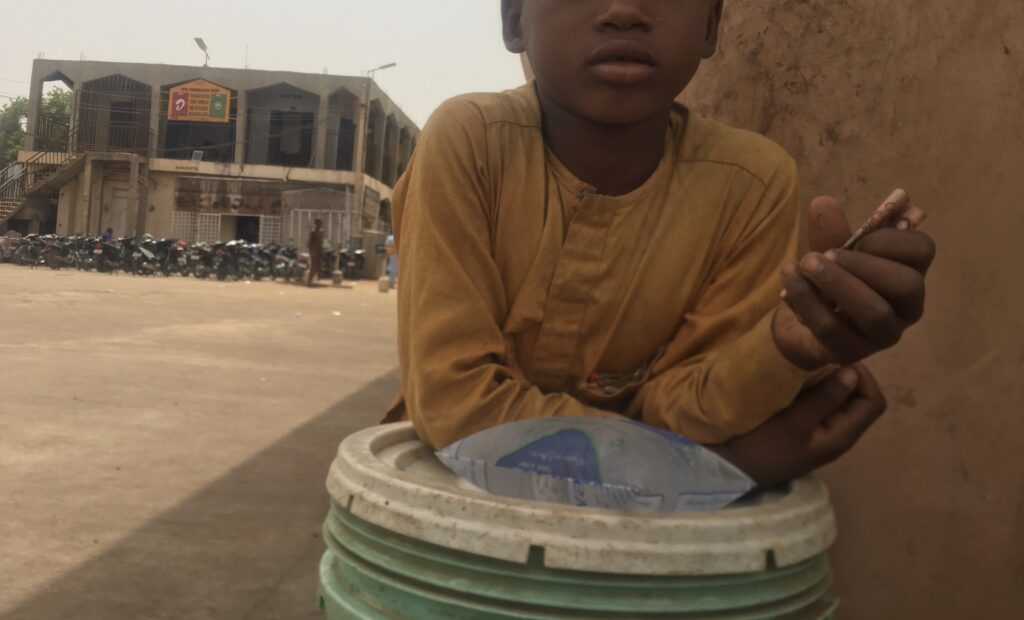
Gaddafi Abubakar Leaning on His Sachet Water Container. Credit: Muheeb Mashood
Throughout the interview with Abubakar, acquiring western education makes little to no sense to him. Becoming a Mallam (an Islamic teacher) is the dream of the ambitious little lad who was determined to support his mother.
Abubakar is not alone on the streets of Sokoto. He is just one of thousands of such kids begging, hawking or doing menial jobs to survive. Analysts believe that this trend contributes to the growing number of out-of-school children in Sokoto state and beyond.
According to a report released by the National Senior Secondary Education Commission (NSSEC), Northern Nigeria recorded the highest school drop-outs in the country, with over 63 percent out of 127,067 children dropping out of school nationwide. This means the region has 80,052 dropouts.
Sokoto recorded 11,339 dropouts, predominantly male students. Factors such as economic pressures—just like the case of Abubakar—cultural norms, prioritising informal apprenticeship and menial jobs over basic education, were identified as causative factors.
‘Hawk or Go Hungry’—The Story of Sokoto Almajiris
Abubakar Gidandare, 17, sat down under the shade of a filling station close to the market. He nestled his head on his lap to relax after moving about the metropolis after recording poor sales in Kunu drinks.
“The drinks are not cold again. That is why you see people dropping it. I have been out as early as 10 a.m., and now I only sell half of the goods. I will need to take the remaining back home for the next day because I normally round up my sales at 1 p.m.,” Gidandare said in distress. “This is what I do everyday. I don’t go to school.”
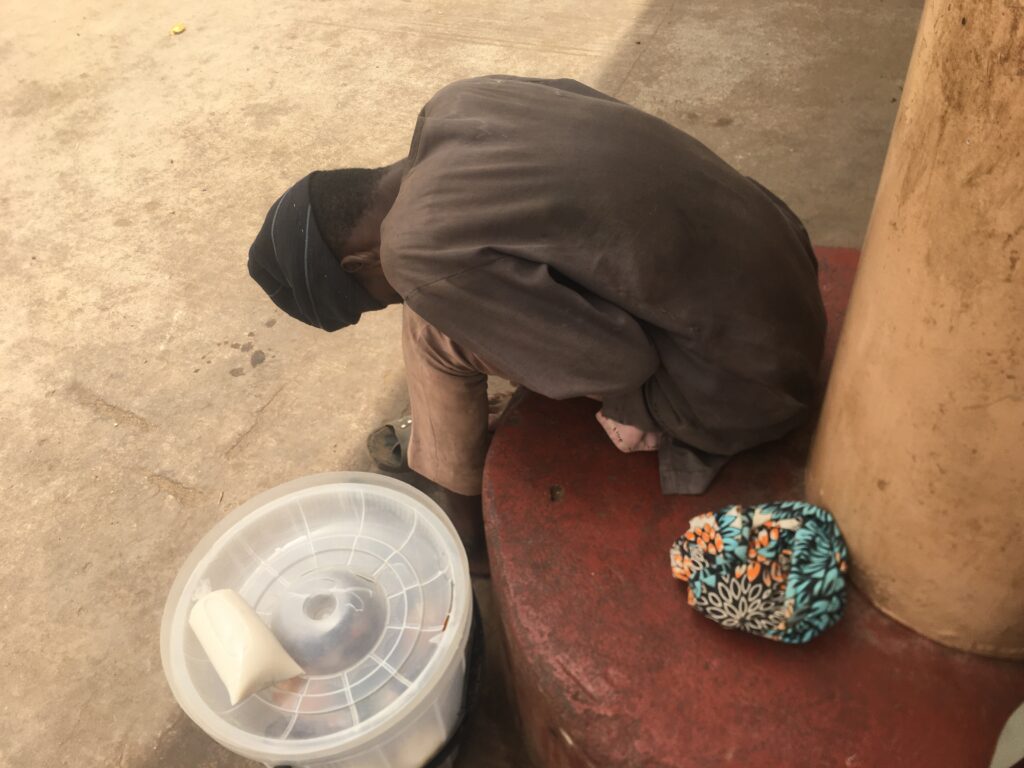
Abubakar Gidandare Sitting Besides His Peddling Bucket. Credit: Muheeb Mashood
Gidandare is among other Almajiri boys who came to Sokoto to source Islamic knowledge. He can neither read nor write his name. He only hawks during the day in exchange for food from the wife of his Mallam. Anytime Gidandare skipped his daily routine, he suffered the pains of going empty stomach throughout that day.
The plight of Gidandare reflected the struggle of 10 million children under the management of the Almajiri system in Northern Nigeria, the majority of whom lacked access to basic welfare. Despite increased primary school enrollment, Sokoto state accommodates 113,208 Almajiri children, mostly boys living outside of family care.
For Zul-Kifilu Muhammed, 15, despite the free basic educational system being practiced in Sokoto, he believes enrollment in school is too expensive.
He stressed, pupils only guaranteed food during the fasting period of Ramadan at his Almajiri center. In order to survive in ordinary days, the daily struggle of selling sachet water has become the fate of Muhammad. “With my sachet water business, I make at least N2,000 everyday. And I feed myself.”
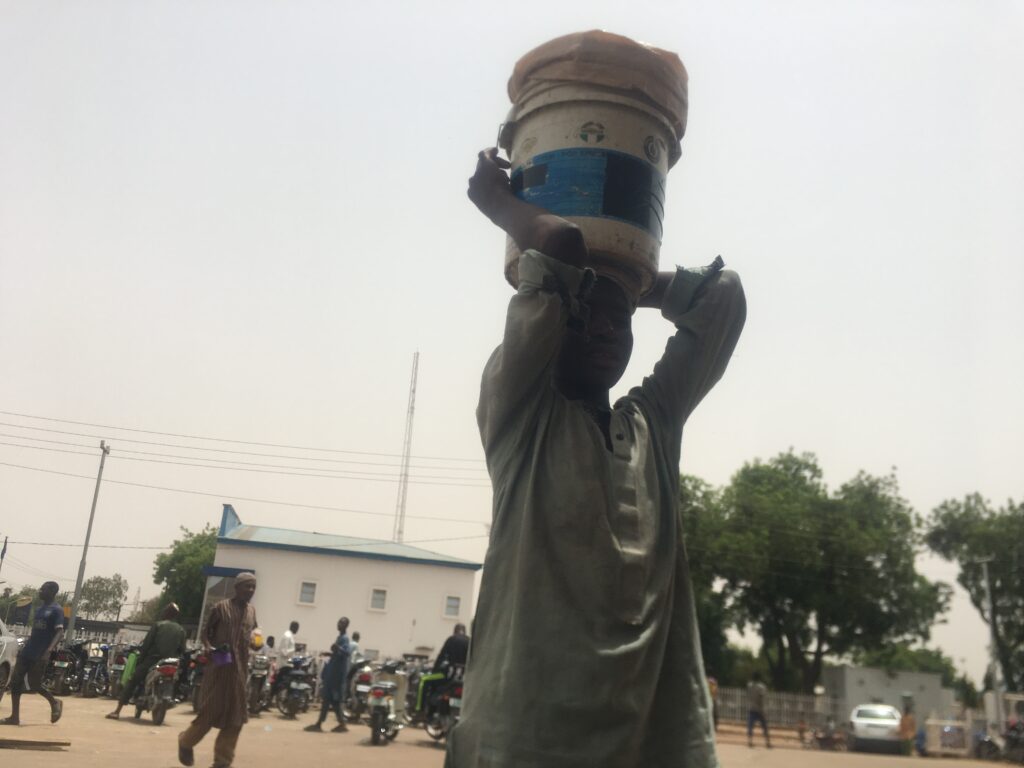
Zul-Kifilu Muhammed Holding his Peddling Bucket on his Head. Credit: Muheeb Mashood
Leaving the center at 10 a.m. and returning at 7 p.m. everyday, Muhammed noted that the sun exposed him to life-threatening living conditions.
Mallam Tukur Abubakar, an Islamic teacher in Sokoto, explained there are counts of children under the management of his Almajiri center which makes it impossible for him to feed them. He emphasized that they ensured every parent provides for the welfare of their children but some parents defy this agreement.
“If you bring a child to me, you have to take care of his welfare. Our part in their life is to give them Al-Ilimin Addini (religious knowledge) they deserve.”
Mallam Abubakar appealed to the government and other non-state actors to donate their support in helping the system to be formally organized because “I want the children to at least understand how to count numbers in English.”
Chased and Driven By Despair
Aisha, Fatimah and their brothers appearing very shabby are bloods united by the street after they found their way to Sokoto when bandits besieged their village in Katsina.The incident that saw parents hiding their children.
Amidst the armed struggle, the bandits candled the village, kidnapped some parents and left others behind being killed. After the atmosphere was settled, those who survived among the adults came to rescue the hidden children.
“Everybody was told to find their way out of the village. Somebody helped us and paid for our transport. That’s how we ended up here,” Fatima broke the silence.
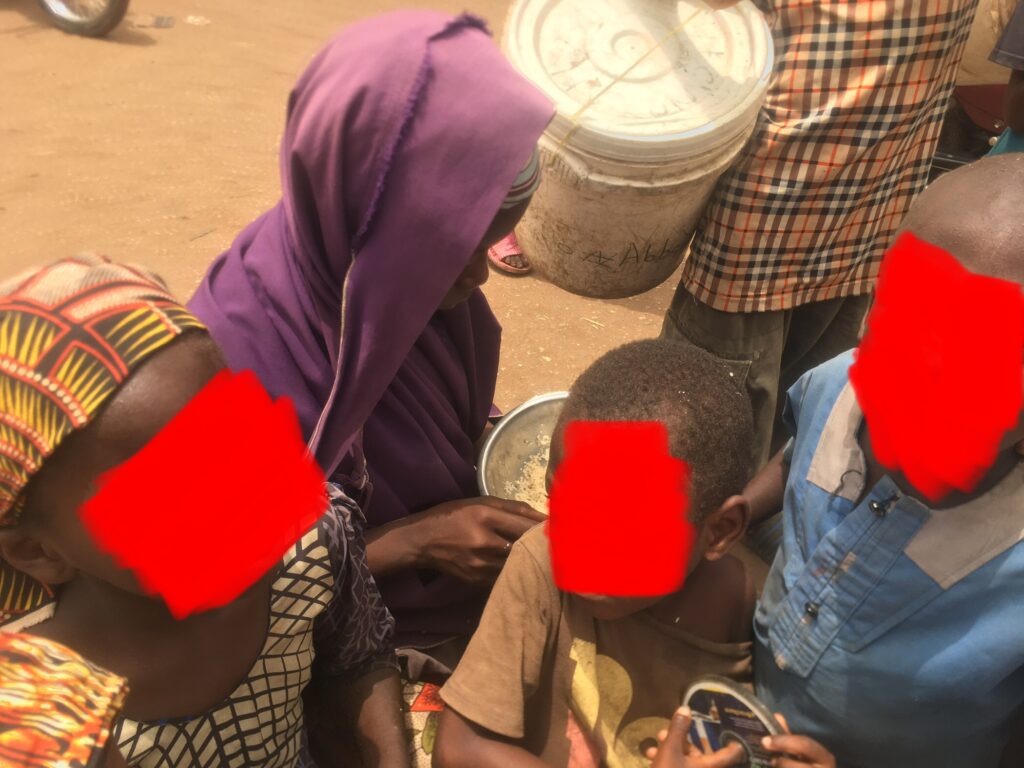
Aisha, Fatima and Their Two Brothers. Credit: Muheeb Mashood
Now left with no parents, the children formed a family in Sokoto, and solely depended on begging. Just like their parents, the children’s school teacher also met his end, with the children’s school life being cut short.
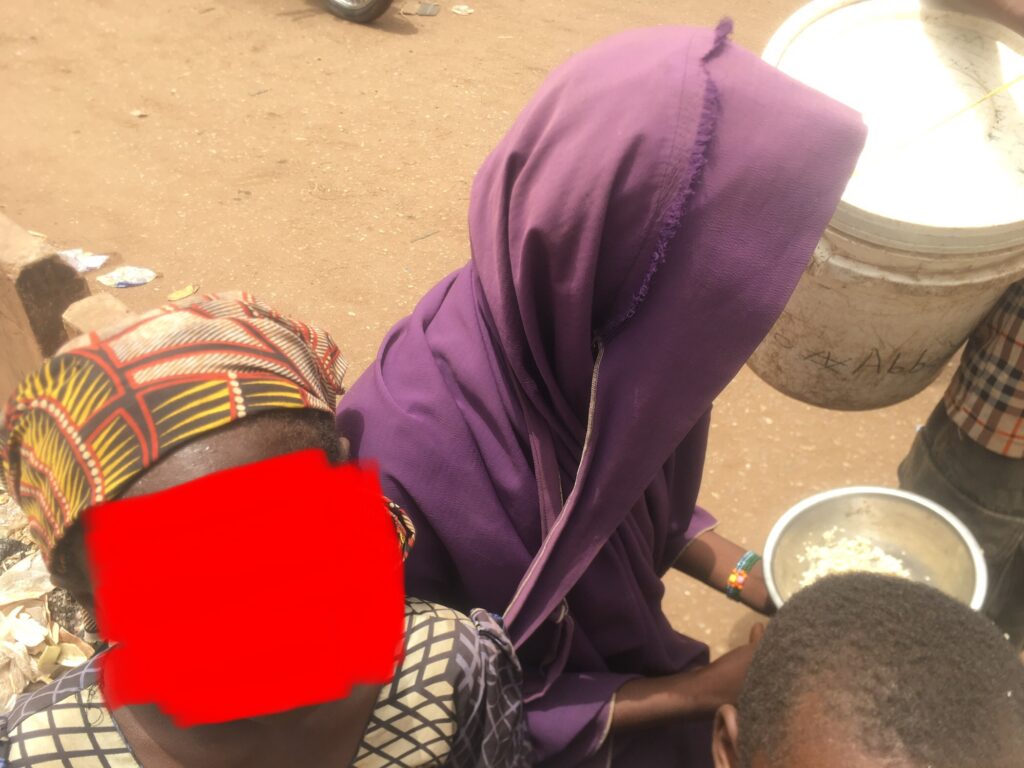
Aisha and Fatima. Credit: Muheeb Mashood
The Health Implications of Sokoto Out-of-School Hustlers
Professor Abdulrazaq Taiwo, the Dean of the Faculty of Dental Science at Usmanu Danfodiyo University Teaching Hospital (UDUTH), maintained that protein and carbohydrate are the major classes of food that contribute nutrition in the human body.
Dr Taiwo pointed to stunted cognitive power and physical growth as the consequences of malnutrition among children. His attention focused on the mental impairment, arguing that such a child will suffer from disposition of sound judgements.
Speaking on the health challenges of the children’s exposure to harsh climate, Dr Taiwo said “the weather is very hot, and when you spend too much time under it, you will lose a lot of water. You can be dehydrated, you can have a stroke, and you can die from it.”
The medical practitioner said that the children risked food borne diseases, typhoid, diarrhea, and other similar diseases due to the kind of food and water they consume.
“They take food from anybody, they don’t know how the food is being processed, they take several foods in the same plate without bothering washing the plates.”
Stunting is recognized among the dire consequences of malnutrition, especially children. According to the World Health Organisation (WHO), stunting occurs when a child has not received proper and adequate nutrition over an extended period. The problem has majorly been linked to poverty.
Of all children interviewed by this reporter, and others roaming the streets, one thing is unique about them. They appeared below their age, dressed in tattered clothes, with some moving around barefooted.
Data by UNICEF showed that the country accounts for one of the highest burdens of stunted children in the world, with a national prevalence rate of 34.2-percent of children under five.
The organization further noted that nothing less than 2 million children in Nigeria battle with severe acute malnutrition, resulting from insufficient energy, protein and other nutrients to cover individual needs. In Sokoto alone, approximately 900,000 people are currently and acutely food insecure, a figure expected to increase to 1.2 million during the lean season.
The implication of the above data is saddening. For the last five years, 74 infant deaths have been recorded while under-five mortality increased to 117 per 1,000 live births respectively.
Neglecting School While Leaving Home for Menial Works
At Dendima, an outskirt of Sokoto, school-age children were so occupied, working at a recycling field where the shadow of trees prevented them from exposure to the harsh climate.
Before an interview with these children, this reporter sought permission from their headmaster who was referred to as ‘manager’, and also appeared in his mid 20s.
When Ibrahim Abdul, 15, started working on the recycling site two years ago, he said he always resumed working on the site after he returned from school. But he is no longer going to school, as he now works on the site from morning till the evening.
When the children revealed that they make N2,000 while leaving the field every evening, this reporter confirmed the information from their manager who corroborated the findings.
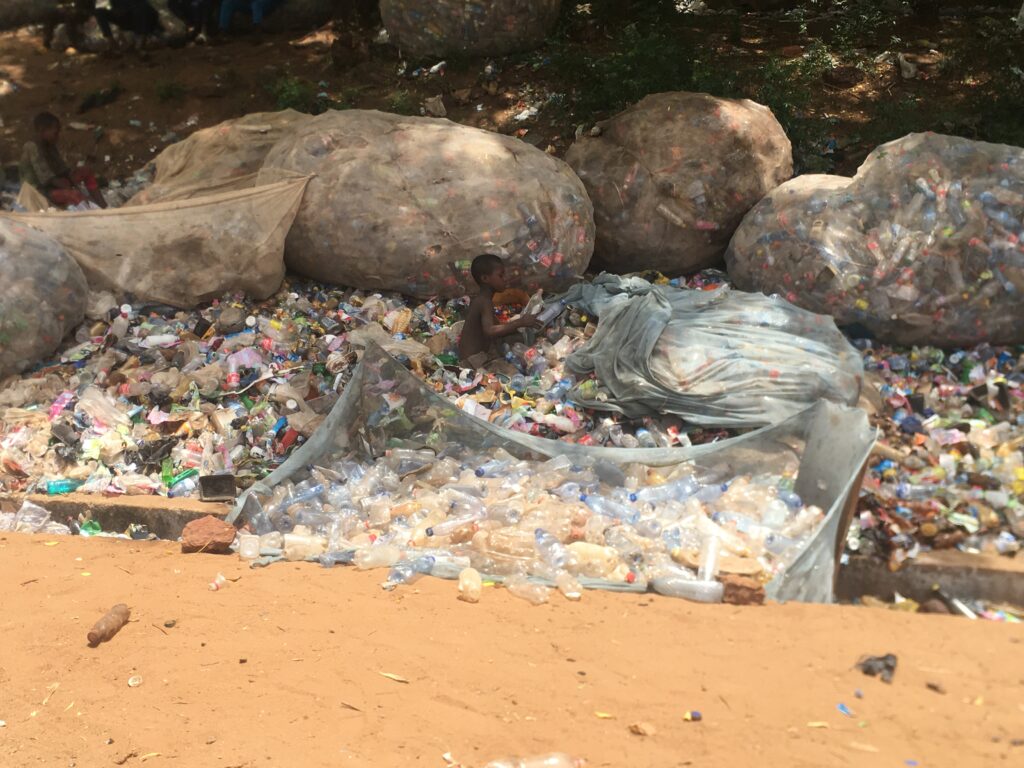
School-Age Boy Working at a Recycling Field at Dendima, Sokoto. Credit: Muheeb Mashood
Findings also showed that illiteracy, poverty and economic hardships have been the main reasons that warranted parents’ indifferent action whenever their children neglected school to engage in menial works.
“There’s possible involvement in petty crimes, prostitution and drug abuse. Those children going out for menial jobs sometimes ended up in using drugs and doing thuggery,” said Professor Shehu Yahaya Tsagem, a professor of Education at Usmanu Danfodiyo University, Sokoto.
A 2025 research report revealed that in Sokoto, many children are compelled to abandon their studies to engage in labour to support their families, perpetuating the cycle of poverty and limiting opportunities for upward mobility.
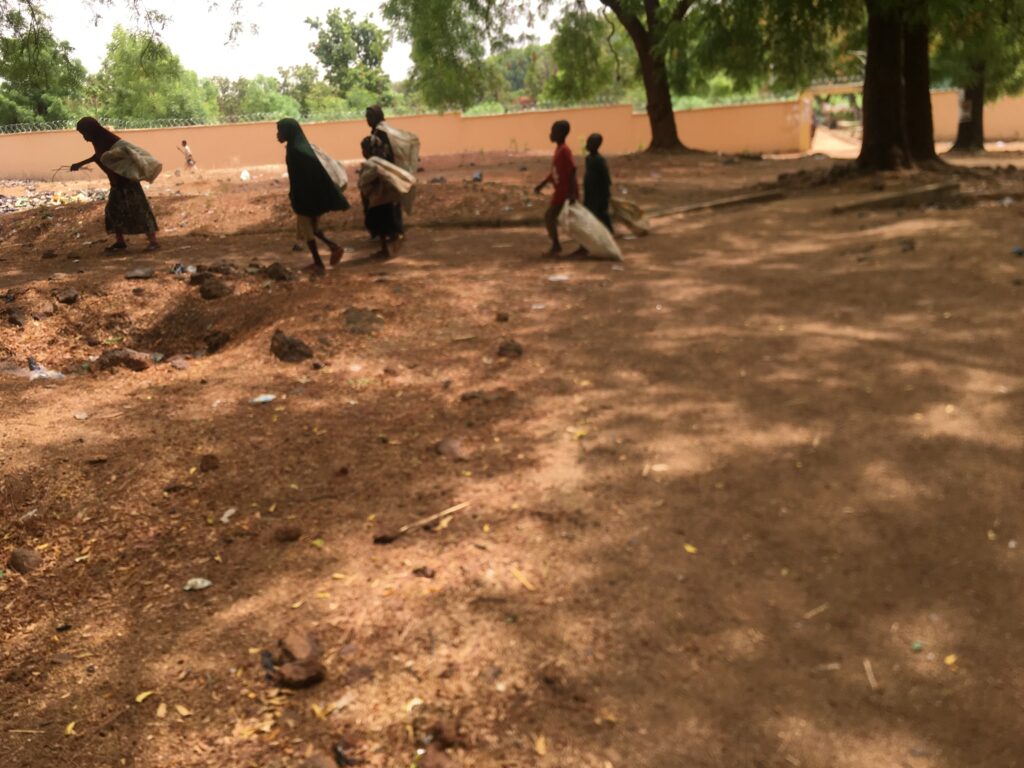
A Group of Children Picking Recycling Items During the School Hours Around Danfodiyo University, Sokoto. Credit: Muheeb Mashood
Professor Shehu Yahaya Tsagem, who specializes in Guidance and Counseling, further emphasized exclusion from political, economic and social activities and opportunities as another major problem that faced the children.
Professor Tsagem blamed the governments for not giving the problem the adequate attention it needed. He said the problem can only be tackled with the presence of political will.
“There should be a massive awareness campaign on the importance of formal education from the grassroots through traditional rulers, religious leaders and people whom they trust.”
Maturing into Criminality: A Corollary of the Children’s Vulnerability
On Monday, 2nd June, HumAngle, a media organization focused on covering conflict and insecurity in Nigeria, published a months-long investigation, diving into how terrorists in North-Central Nigeria are weaponizing hunger as a strategy to recruit vulnerable children into their violent war against humanity. The report uncovered how children can be easily lured into criminality when they are well fed and promised of enough food.
The HumAngle’s investigation reflected the cancerous implication of Sokoto’s school age children being driven to streets in search of food.
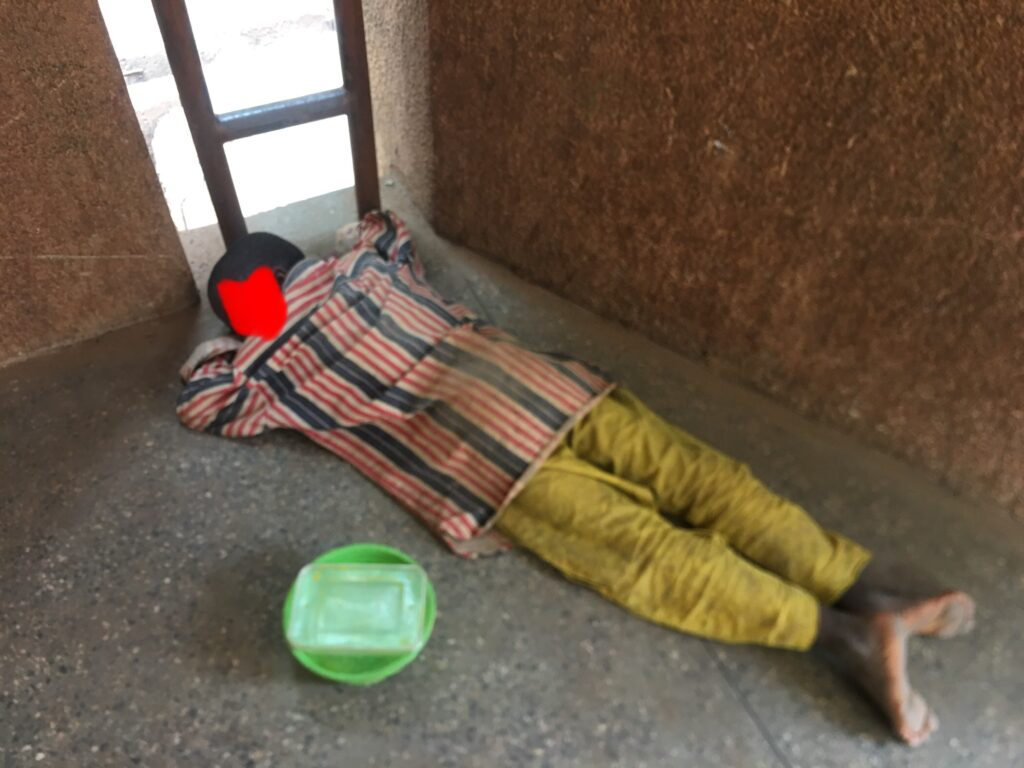
School-Age Boy Sleeping During the School Hours at Danfodiyo University, Sokoto. Credit: Muheeb Mashood
Engaging children in criminal activities is a disturbing phenomenon in Nigeria. For instance, more than 8,000 children were trapped in insurgents’ recruitment, using them as child soldiers while playing different roles for the armed groups since 2009.
Similarly, drug abuse has been categorized as one of the direct implications of dropouts among adolescent children in Sokoto, paving the way to other vices: violence, destruction of public properties, broken homes, sexual abuses, commission of crimes, thefts, and the likes.
Parents, Sokoto Government Violate Extant Law
In 2021, the Sokoto state government passed the Sokoto State Child Protection Law. The law makes provision for right to free, compulsory and universal education for every children. This includes right to parental care, protection and maintenance; protection against child labour, especially when it will interfere with the education of such child in question.
For instance, Section 23 protect children under the age of 18 years from exposure to child labour while specifying punishment for any person found guilty of contravening the section. The law also mandated the government to implement the law.
Section 15 subsection 1 reads: “Every child has the right to free, compulsory, and universal basic education and shall be the duty of the Government in the state to provide such education.”
Yet, children of school age interviewed by this reporter and several others roaming the streets enjoy a shadow of the law. Parents and the government violated numerous provisions of the Law with impunity.
Barrister Ahmed Musa, a legal practitioner from Kano, argued that the poor implementation of the Sokoto Child Protection Law 2021, stemmed from a mix of systemic, cultural, and institutional challenges.
Insufficient public awareness means perpetrators and victims often do not recognize when rights are being violated, he said, explaining that lack of standardized enforcement units or task force dedicated to child protection usually resulted in poor prosecutions or low conviction rates.
“Outdated penalty structures don’t deter offenders effectively, as fines or custodial sentences are not proportionate in preventing further occurrence.”
The human rights advocate suggested youth mobilization serving as facilitators and change agents as one of the methods to curb the issue. He emphasized that the youth should be empowered with resources to serve as community-watchdogs while reporting violations and referring cases to authorities.
“Form statutory Child Rights Committees at the state and the local levels. This should comprise government representatives, civil society organizations, women lawyers, media, and security officers, with clear terms of reference. Ensure the committees meet quarterly to review cases, track referrals, and publish progress reports.”
Sokoto Government Keeps Mum
When contacted, the Sokoto government kept silent . This reporter visited the Sokoto State Ministry of Justice for an interview, and was directed to submit a letter. Despite revisitation, multiple telecommunications reminders, the state government failed to respond as of press time.
This reporting was completed with the support of the Centre for Journalism Innovation and Development (CJID)

